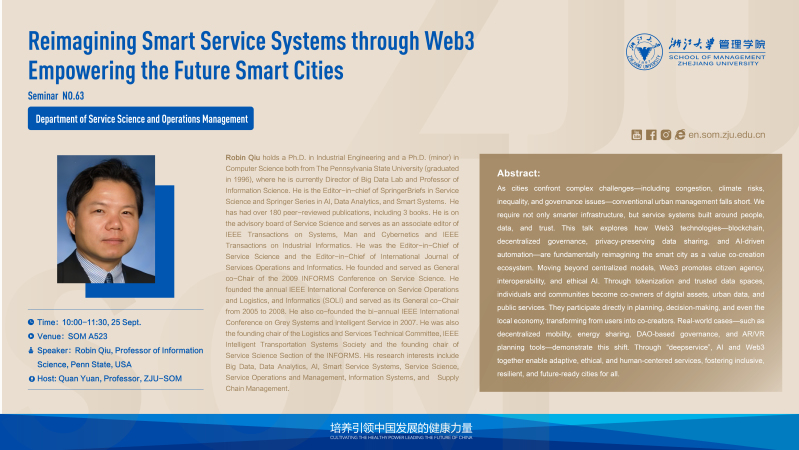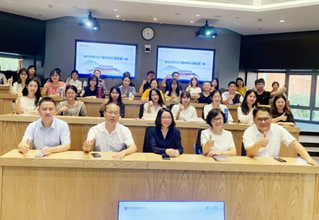Time:10:00-11:30, 25 Sept.
Venue:SOM A523
Speaker:Robin Qiu, Professor of Information Science, Penn State, USA
Host: Quan Yuan, Professor, ZJU-SOM
Biography:

Robin Qiu holds a Ph.D. in Industrial Engineering and a Ph.D. (minor) in Computer Science both from The Pennsylvania State University (graduated in 1996), where he is currently Director of Big Data Lab and Professor of Information Science. He is the Editor-in-chief of SpringerBriefs in Service Science and Springer Series in AI, Data Analytics, and Smart Systems. He has had over 180 peer-reviewed publications, including 3 books. He is on the advisory board of Service Science and serves as an associate editor of IEEE Transactions on Systems, Man and Cybernetics and IEEE Transactions on Industrial Informatics. He was the Editor-in-Chief of Service Science and the Editor-in-Chief of International Journal of Services Operations and Informatics. He founded and served as General co-Chair of the 2009 INFORMS Conference on Service Science. He founded the annual IEEE International Conference on Service Operations and Logistics, and Informatics (SOLI) and served as its General co-Chair from 2005 to 2008. He also co-founded the bi-annual IEEE International Conference on Grey Systems and Intelligent Service in 2007. He was also the founding chair of the Logistics and Services Technical Committee, IEEE Intelligent Transportation Systems Society and the founding chair of Service Science Section of the INFORMS. His research interests include Big Data, Data Analytics, AI, Smart Service Systems, Service Science, Service Operations and Management, Information Systems, and Supply Chain Management.
Abstract:
As cities confront complex challenges—including congestion, climate risks, inequality, and governance issues—conventional urban management falls short. We require not only smarter infrastructure, but service systems built around people, data, and trust. This talk explores how Web3 technologies—blockchain, decentralized governance, privacy-preserving data sharing, and AI-driven automation—are fundamentally reimagining the smart city as a value co-creation ecosystem. Moving beyond centralized models, Web3 promotes citizen agency, interoperability, and ethical AI. Through tokenization and trusted data spaces, individuals and communities become co-owners of digital assets, urban data, and public services. They participate directly in planning, decision-making, and even the local economy, transforming from users into co-creators. Real-world cases—such as decentralized mobility, energy sharing, DAO-based governance, and AR/VR planning tools—demonstrate this shift. Through “deepservice”, AI and Web3 together enable adaptive, ethical, and human-centered services, fostering inclusive, resilient, and future-ready cities for all.

欢迎广大师生积极参与!





